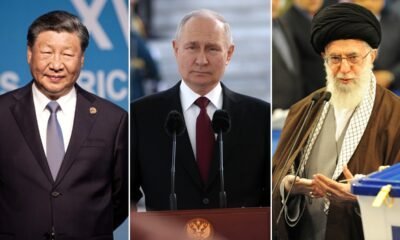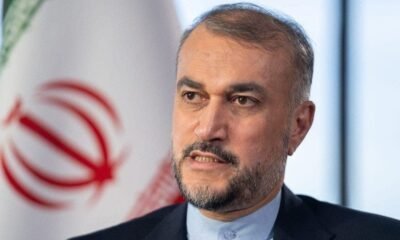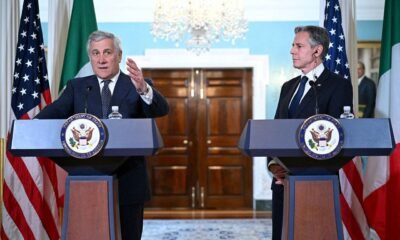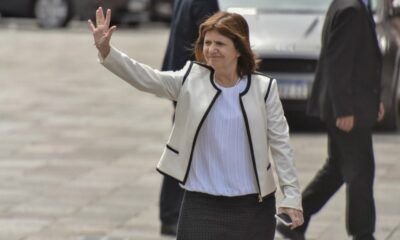INTERNACIONAL
Finland presidential candidates compete to shape country’s foreign and security policies involving Russia
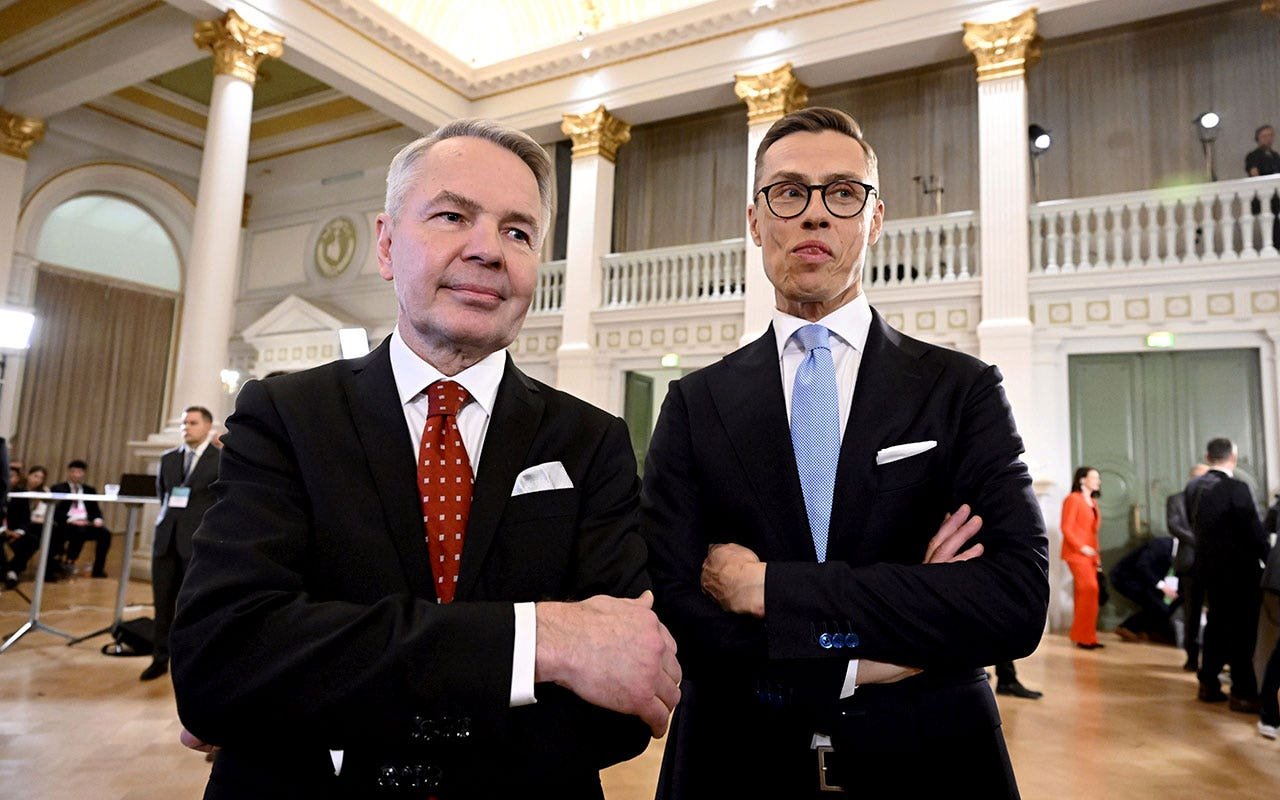
- On Sunday, Finns will choose between two experienced politicians, Alexander Stubb and Pekka Haavisto, to lead the country’s foreign and security policy.
- Stubb and Haavisto largely agree on Finland’s foreign priorities, such as maintaining a tough stance toward Russia and enhancing ties with the U.S.
- Stubb is more open to allowing NATO’s nuclear weapons in Finland, reflecting his pro-NATO stance, while Haavisto is more cautious.
Finns on Sunday will choose either of two experienced politicians to be their next head of state, whose main task will be to steer the Nordic country’s foreign and security policy now that it is a member of NATO, following Russia’s invasion of Ukraine.
Ex-Prime Minister Alexander Stubb, 55, on the center right, and former foreign Minister Pekka Haavisto, 65, from the green left, largely agree on Finland’s foreign policy and security priorities. These include maintaining a hard line toward Moscow and Russia’s current leadership, strengthening security ties with Washington, and the need to help Ukraine both militarily and at a civilian level.
In the last days of campaigning, however, tiny differences in style and approach between the candidates have emerged.
FINLAND EXTENDS CLOSURE OF RUSSIAN BORDER, SAYING MOSCOW HASN’T STOPPED SENDING MIGRANTS
«After the exceptionally polite campaigning of the first round, there has been a bit more confrontation» between the two men vying for the post, said Teivo Teivainen, professor of world politics at the University of Helsinki.
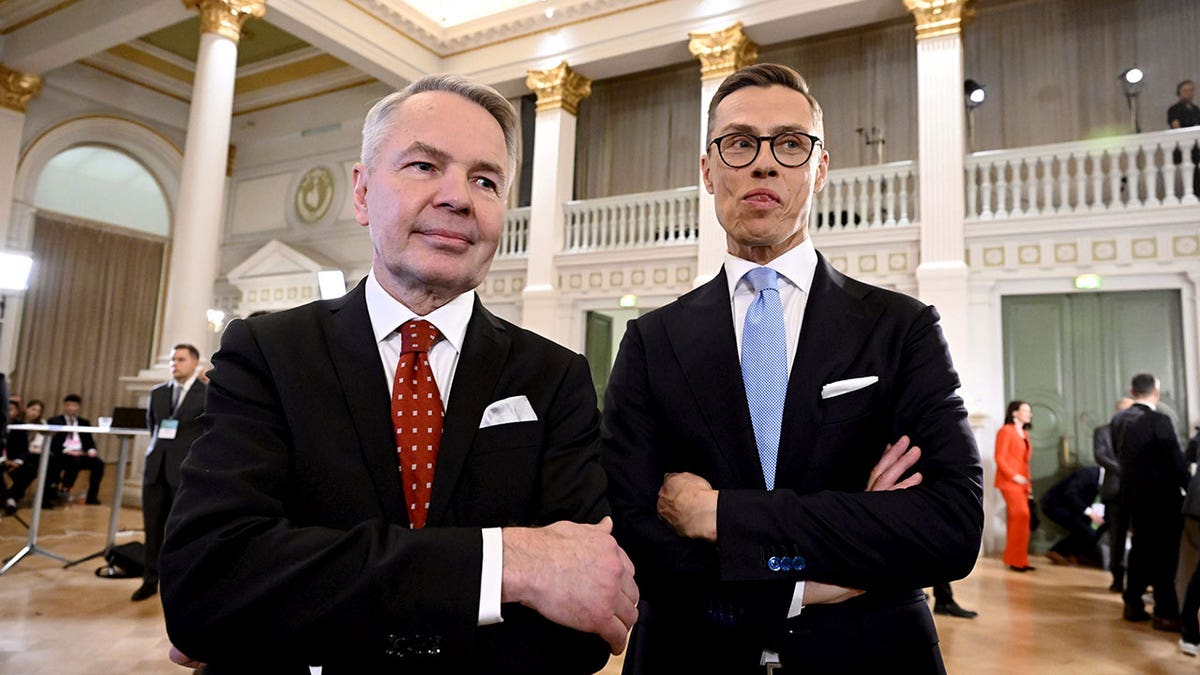
National Coalition Party candidate Alexander Stubb, right, and Social Movement candidate Pekka Haavisto stand during a presidential election event at the Helsinki City Hall, in Helsinki, Finland, on Jan. 28, 2024. Finns on Sunday will choose either of two experienced politicians to be their next head of state, whose main task will be to steer the new NATO member’s foreign and security policy. (Markku Ulander/Lehtikuva via AP, File)
Stubb and Haavisto differ in their stance on the hypothetical question of whether Finland, a NATO newcomer, would allow the transportation of the alliance’s nuclear weapons through its territory.
«Stubb has a more positive attitude in bringing in nuclear weapons into Finland’s territory,» Teivainen said. «This reflects his slightly more positive line towards NATO integration and the United States.»
Unlike in most European countries, the president of Finland holds executive power in formulating foreign and security policy together with the government, especially concerning countries outside the European Union such as the United States, Russia and China.
The head of state also commands the military, particularly important in Europe’s current security environment and the changed geopolitical situation of Finland, which joined NATO in April 2023 in the aftermath of Russia’s attack on Ukraine a year earlier.
A brief look at a map shows why foreign and security policy are so important in this northern European country of 5.6 million people: Finland shares a 1,340-kilometer (832-mile) border with Russia. In November, Helsinki closed all eight official border crossings with its eastern neighbor, alleging that Moscow was using migrants to destabilize Finland in an alleged act of «hybrid warfare.»
A politician with the conservative National Coalition Party, Stubb took the top spot in the first round of the election on Jan. 28 with 27.2% percent of the votes, ahead of the eight other candidates — five men and three women.
Stubb, who led the government in 2014-2015 and earlier held several other Cabinet posts, is the favorite to win the presidency and succeed highly popular President Sauli Niinistö, whose second six-year term expires in March. He is not eligible for reelection.
Haavisto, the runner-up in the first round, was Finland’s top diplomat in 2019-2023 and the main negotiator of its entry into NATO. A former conflict mediator with the United Nations and a devout environmentalist, Haavisto took 25.8% of the votes in the first round.
A runoff was required because none of the candidates got more than half of the votes on Jan. 28. Recent polls indicate Stubb is the front-runner: he is predicted to get 53% to 54% of the votes and Haavisto 46% to 47%.
Haavisto, a former leader of the Green League who is running as an independent, is seeking the post for a third consecutive time after the 2012 and 2018 elections.
The head of state is expected to remain above the fray of day-to-day politics and largely to stay out of domestic political disputes.
However, Finland was hit by massive labor union strikes earlier this month, and the two candidates have faced questions on the campaign trail.
Stubb distanced himself from his party’s approach of giving employers and employees more freedom to settle disputes locally and said he wouldn’t interfere with labor market issues as a president. For his part, Haavisto said he would try — at the very minimum — to bring the parties together for talks behind the scenes.
FINLAND TO CLOSE ENTIRE BORDER WITH RUSSIA OVER CONCERNS OF ‘ORGANIZED’ MIGRANT CROSSINGS
The swing voters will be the supporters of the far-right populist The Finns party and the rural-based Center Party. The candidates for those parties were eliminated in the first round, but some 615,000 people, or nearly 20% of voters, cast their vote for the speaker of Parliament, Jussi Halla-aho, the former leader of The Finns.
Those voters favoring traditional values will now decide the Finnish presidency, analysts say.
«The second round of the election will primarily be decided by the voters of The Finns and the Center Party,» Teivainen said. «There’s a lot of conservatism and patriotism among them, so Haavisto’s homosexuality and civil service background have significance.»
Conscription military service or civil service is mandatory for Finnish males.
Haavisto’s strong advocacy for green policies is seen alienating or splitting some voters, while Stubb’s center-right backers seem much more united in their support.
INTERNACIONAL
Elecciones en Francia: quién es Jean-Luc Mélenchon, el polémico líder de la izquierda que dio el batacazo

Cuatro días después de que Emmanuel Macron convocara a elecciones anticipadas tras los malos resultados en el parlamento europeo, un grupo de partidos se unieron y formaron el Nuevo Frente Popular, una coalición destinada a resucitar el Frente Popular que llegó al poder en 1936 para frenar a la extrema derecha, y que promulgó políticas sociales que incluían semanas laborales de 40 horas y licencias remuneradas para los trabajadores.
La amplia –y potencialmente rebelde– alianza estaba encabezada por Jean-Luc Mélenchon, tres veces candidato presidencial (en 2012, 2017 y 2022, mejorando los resultados de cada elección con respecto a la anterior) y líder del partido Francia Insumisa. A él se han sumado los socialistas, los comunistas, los Verdes, y la Place Publique, encabezada por el popular miembro del Parlamento Europeo (MEP) Raphaël Glucksmann.
Y la estrategia parece haber funcionado. En la primera ronda electoral el Nuevo Frente Popular quedó en segundo lugar tras Agrupación Nacional (RN) de la extrema derecha y por delante del actual partido mayoritario del presidente Emmanuel Macron. Y ahora dio el batacazo.
Mélenchon, de 72 años, lleva décadas en la escena política francesa, en las que ha perfeccionando su lírica forma de hablar, mientras abraza sin concesiones las ideas de la izquierda. En el pasado, cuando era miembro del Partido Socialista, ocupó cargos ministeriales en gobiernos anteriores.
De acuerdo a su propia biografía, Mélenchon nació en Tánger, Marruecos, en 1951, y es licenciado en Filosofía y Letras Modernas. Como activista socialista, se convirtió en el senador más joven de Francia en 1986. También es autor de 19 libros, entre los cuales se destaca «La era del pueblo», donde expone su teoría de la revolución ciudadana, indica su sitio web.
Desde las elecciones de 2017, el principal catalizador para el rápido ascenso de Mélenchon parecen haber sido sus actuaciones en los debates presidenciales, donde se destacó por la combinación de ingenio, conversación fácil y su sencilla forma de hablar.
Incluso quienes no están de acuerdo con sus puntos de vista, les gusta ver su desempeño en los debates.
En efecto, Mélenchon es una de las figuras más divisivas de la política francesa, que entusiasma y horroriza a los votantes con sus desenfrenadas propuestas de impuestos y gastos, su retórica sobre la lucha de clases y sus posiciones controvertidas en materia de política exterior, especialmente en Gaza, sus críticos lo acusan de antisemitismo, lo que él niega.
Hasta el año 2012, cuando la ola populista aún no había afectado a Europa, Mélenchon era un candidato marginal, pero el paisaje ha cambiado radicalmente desde entonces. Por eso, incluso en un contexto diferente, el candidato se ha hecho popular entre los votantes más jóvenes, se ha destacado en redes sociales y tiene un famoso canal de YouTube.
El es un «Viejo Insumiso» reciclado, desde senador y ministro del Partido Socialista, a rebelde enojado de la izquierda de la izquierda, para ahora representar “al pueblo”. Neopopulismo post Trump de un tribuno excelso, con inigualable oratoria, admirador de Hugo Chávez, Cristina Kirchner y la revolución Bolivariana.
Mélenchon era un senador socialista y trotskista como el ex primer ministro Lionel Jospin. Un verdadero intelectual, que hace de la conversación y la poesía un placer de la vida. Con una abuela andaluza, con un español perfecto, este ex ministro de Educación de la enseñanza superior descubrió el neo populismo chavista y kirchnerista y se enamoró de él. ¿Nostalgia de Mayo del 68? ¿Por qué no? Tuvo inspiración en el argentino Ernesto Laclau y su guía ideológica su esposa, la politóloga y escritora belga, Chantal Mouffe.
Mélenchon es anti europeo pero diferente a Le Pen. Propone salir de los tratados de Europa para reformarlos. Para conseguirlos, promete un duro tour de force con la canciller alemana Ángela Merkel. Piensa sacar a Francia de la OTAN y con su contrincante Marine Le Pen tienen un punto en común, su profunda admiración por el presidente ruso Vladimir Putin.
-
POLITICA3 días ago
Tras romper con Macri, Patricia Bullrich negó su salida del PRO: “Ni loca me voy, nos quedamos”
-
POLITICA1 día ago
Detuvieron a un hombre armado a metros del acto de Milei en San Juan
-
ECONOMIA3 días ago
La inflación de junio rondaría el 5,2% según los analistas consultados por el Banco Central
-
SOCIEDAD3 días ago
Caso Loan: Camila declaró por más de cinco horas y al salir pidió que encuentren al nene
-
POLITICA2 días ago
El Gobierno busca bajar la tensión con el PRO y dice que cumplirá el fallo por la coparticipación a la Ciudad que reclamó Macri
-
POLITICA3 días ago
Federico Sturzenegger es el nuevo ministro de Desregulación y Transformación del Estado



